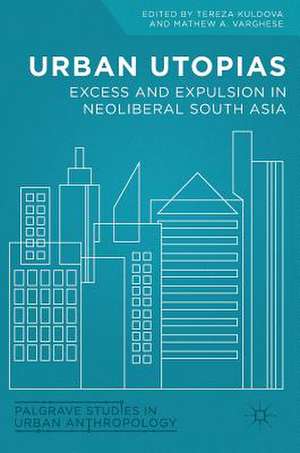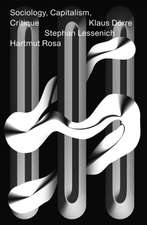Urban Utopias: Excess and Expulsion in Neoliberal South Asia: Palgrave Studies in Urban Anthropology
Editat de Tereza Kuldova, Mathew A. Vargheseen Limba Engleză Hardback – 17 mar 2017
| Toate formatele și edițiile | Preț | Express |
|---|---|---|
| Paperback (1) | 638.57 lei 6-8 săpt. | |
| Springer International Publishing – 7 aug 2018 | 638.57 lei 6-8 săpt. | |
| Hardback (1) | 643.00 lei 6-8 săpt. | |
| Springer International Publishing – 17 mar 2017 | 643.00 lei 6-8 săpt. |
Din seria Palgrave Studies in Urban Anthropology
-
 Preț: 545.88 lei
Preț: 545.88 lei -
 Preț: 390.63 lei
Preț: 390.63 lei -
 Preț: 386.81 lei
Preț: 386.81 lei -
 Preț: 190.31 lei
Preț: 190.31 lei - 15%
 Preț: 584.26 lei
Preț: 584.26 lei - 15%
 Preț: 645.60 lei
Preț: 645.60 lei - 15%
 Preț: 641.71 lei
Preț: 641.71 lei - 18%
 Preț: 737.43 lei
Preț: 737.43 lei -
 Preț: 393.90 lei
Preț: 393.90 lei -
 Preț: 390.25 lei
Preț: 390.25 lei -
 Preț: 386.39 lei
Preț: 386.39 lei - 18%
 Preț: 781.00 lei
Preț: 781.00 lei - 15%
 Preț: 640.24 lei
Preț: 640.24 lei - 18%
 Preț: 781.62 lei
Preț: 781.62 lei - 18%
 Preț: 729.06 lei
Preț: 729.06 lei - 15%
 Preț: 582.45 lei
Preț: 582.45 lei - 18%
 Preț: 779.08 lei
Preț: 779.08 lei - 18%
 Preț: 894.34 lei
Preț: 894.34 lei - 18%
 Preț: 781.94 lei
Preț: 781.94 lei -
 Preț: 387.58 lei
Preț: 387.58 lei
Preț: 643.00 lei
Preț vechi: 756.47 lei
-15% Nou
Puncte Express: 965
Preț estimativ în valută:
123.05€ • 127.74$ • 102.61£
123.05€ • 127.74$ • 102.61£
Carte tipărită la comandă
Livrare economică 22 martie-05 aprilie
Preluare comenzi: 021 569.72.76
Specificații
ISBN-13: 9783319476223
ISBN-10: 331947622X
Pagini: 325
Ilustrații: XVIII, 289 p. 13 illus. in color.
Dimensiuni: 148 x 210 x 24 mm
Greutate: 0.49 kg
Ediția:1st ed. 2017
Editura: Springer International Publishing
Colecția Palgrave Macmillan
Seria Palgrave Studies in Urban Anthropology
Locul publicării:Cham, Switzerland
ISBN-10: 331947622X
Pagini: 325
Ilustrații: XVIII, 289 p. 13 illus. in color.
Dimensiuni: 148 x 210 x 24 mm
Greutate: 0.49 kg
Ediția:1st ed. 2017
Editura: Springer International Publishing
Colecția Palgrave Macmillan
Seria Palgrave Studies in Urban Anthropology
Locul publicării:Cham, Switzerland
Cuprins
1. Introduction: Urban Utopias - Excess and Expulsion in Neoliberal India and Sri Lanka.- 2. The Impossibility of World Class Slum Free Indian Cities and the Fantasy of ‘Two Indias’.- 3. Guarded Luxotopias and Expulsions in New Delhi: Aesthetics and Ideology of Outer and Inner Spaces of an Urban Utopia.- 4. Golden or Green? Growth Infrastructures and Resistance in Goa.- 5. Vikasanam: The Expansionist Choreography of Space-Making in Kerala.- 6. Cities of Neoliberal Future: Urban Utopia in Indian Science Fiction Cinema.- 7. Manifesting Sri Lankan Megalomania – the Rajapakses’ Vision of Empire and of a Clean Colombo.- 8. A Modern Chakravartin: Mayawati’s New Buddhist Visual Culture.- 9. Past as Metaphor in the New Utopian Imaginations of Heritage in Kerala.- 10. Excavating the City: Metro Rail Construction and Imagination of Past in Contemporary Jaipur.- 11. Utopia or Elsewhere: Queer Modernities in Small Town West Bengal.- 12. Utopia Interrupted: Indian Sex/Gender Dissident Activism and The Everyday Search for a Life Worth Living.- 13. ‘Queerness's Domain? Queer Negotiations, Utopian Visions, and the Failures of Heterotopias in Bangalore.- 14. Philosophical Epilogue.
Notă biografică
Tereza Kuldova is Researcher at the Department of Archaeology, Conservation, and History, University of Oslo, Norway, and Visiting Senior Researcher at the Department of Cultural and Social Anthropology, University of Vienna, Austria.
Mathew A. Varghese is a non-resident research fellow with The Centre for Public Policy Research (CPPR), Kochi, India, and Lecturer at The Maharajas College, Kerala, India.
Textul de pe ultima copertă
This book brings anthropologists and critical theorists together in order to investigate utopian visions of the future in the neoliberal cities of India and Sri Lanka. Arguing for the priority of materiality in any analysis of contemporary ideology, the authors explore urban construction projects, special economic zones, fashion ramps, films, archaeological excavations, and various queer spaces. In the process, they reveal how diverse co-existing utopian visions are entangled with local politics and global capital, and show how these utopian visions are at once driven by visions of excess and by increasing expulsions. It’s a dystopia already in the making – one marred by land grabs and forced evictions, rising inequality, and the loss of urbanity and civility.
Caracteristici
Provides an analysis of emergent utopian formations within the context of intense urbanizations, global re-networking, and social restructuring Focuses on processes that emerged post-2000; a period in which a gamut of urban re-conceptualizations and spatial reorderings took place Sheds new light on an understudied and oft ignored population














